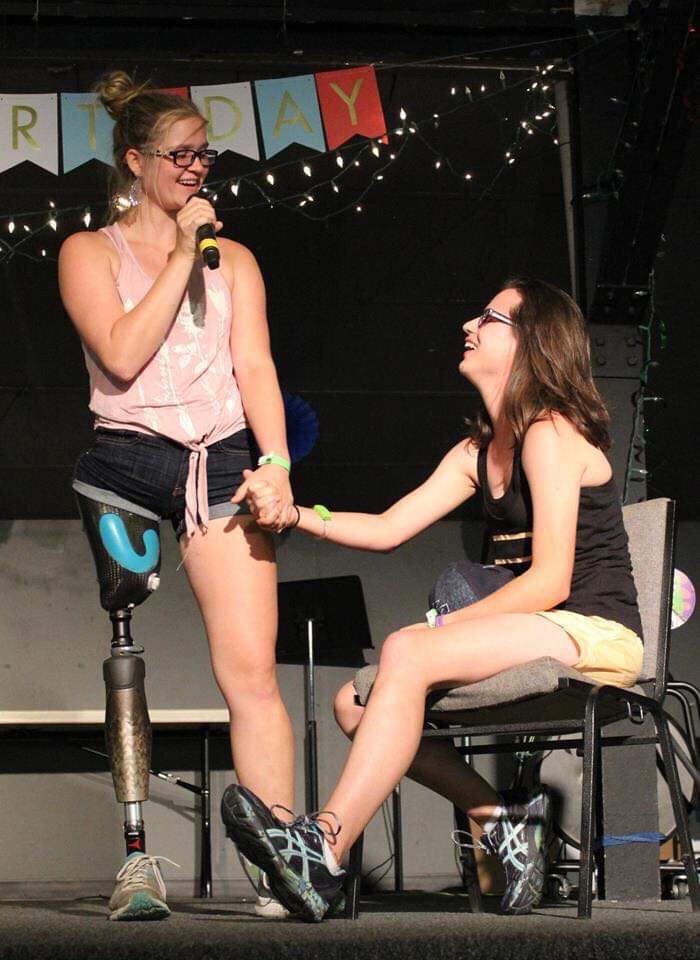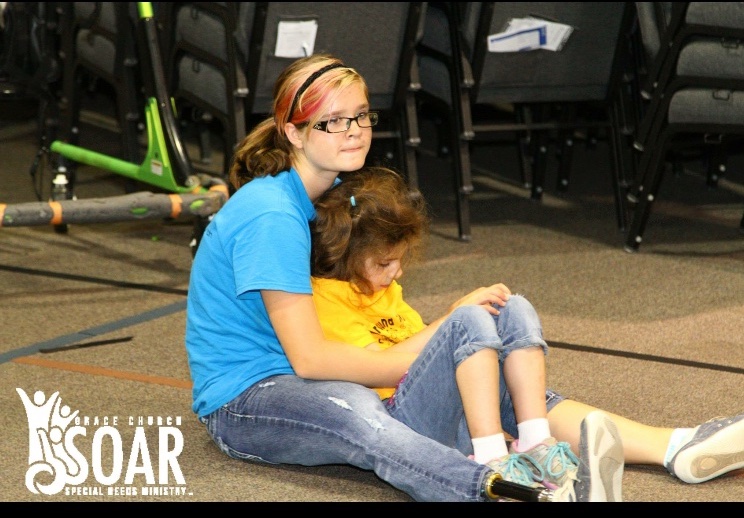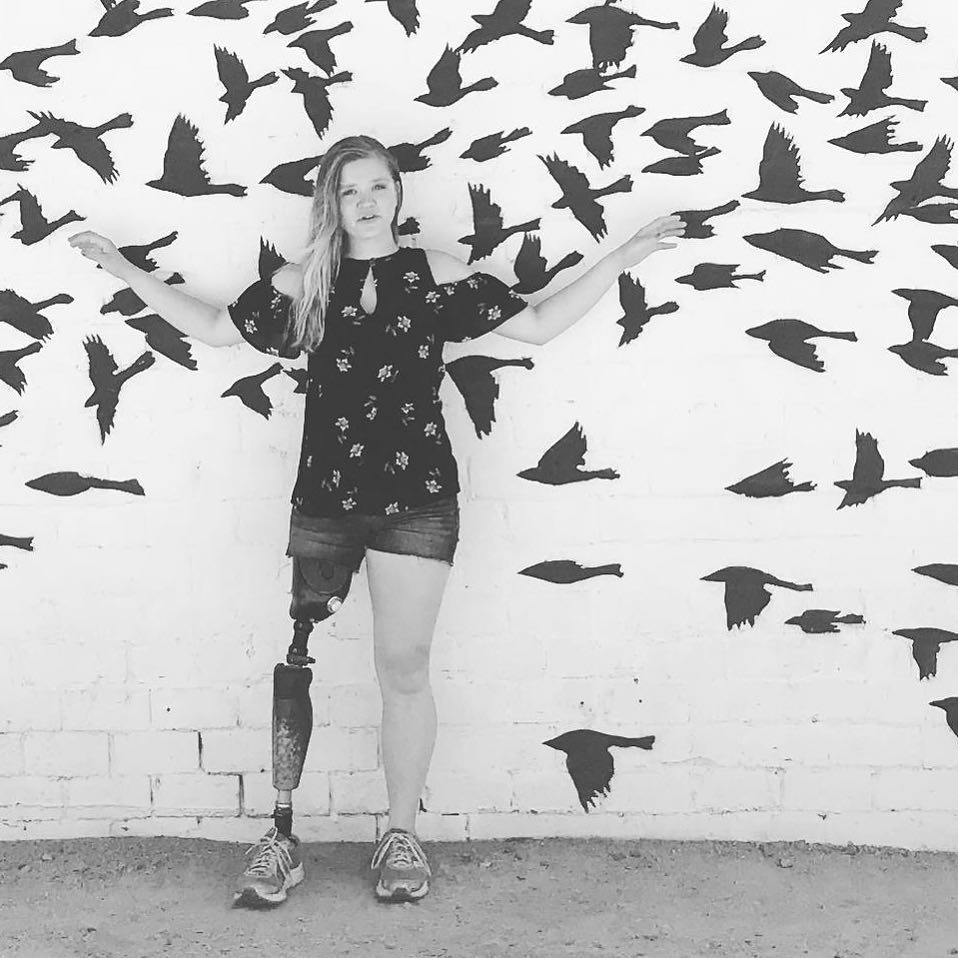
Adolescence is a hard time for anyone. You’re learning how to navigate the world, discovering yourself as a person and how life works in general. All the while working through challenging changes throughout your life. It’s a hard and difficult time for anyone, but for Mariah Gabrielli, she has her own unique struggles to add to the list. At the age of seven, a stage where fitting in and making friends is a prime aspect of a child’s life, Mariah was diagnosed with Osteosarcoma, a form of bone cancer that would eventually result in the loss of her leg. “I was diagnosed in November and they told me I had stage four cancer, and that my chances of survival were really low,” Mariah explains (00:07). Mariah’s tumor resided in her knee, causing her leg to be “almost triple the size it needed to be” making Mariah’s illness very visible and giving her something that separated her from all the other kids (28:59). It didn’t end there for Mariah. After seeking out options to cure cancer, even suffering month after month on Adriamycin, one of the strongest forms of chemotherapy, it was clear to doctors her tumor was not going to shrink. A decision was made by Mariah’s family and doctors that amputation was the best option to ensure her the best chance of survival. Even if it meant losing a few friends along the way.
She did, in fact, lose friends along the way. At the age of seven, friends are everything. For Mariah, her closest friends came in a group of three. They did absolutely everything together. Hung out on the playground together, played on the same soccer team, sleepovers on the weekends, all normal things that seven-year-old girls would do. It seemed as if nothing could tear them apart; until Mariah’s amputation came along. Sitting down with her friends at lunch, a daily tradition, Mariah informed her friends that she would be going down to Texas, the location of her amputation specialist, to get her leg cut off. One friend in her group did not take the news well, “she stopped talking to me afterwards,” Mariah recounts on the reaction (28:59). All because of an amputation, not even the amputation itself but a simple conversation. Mariah’s world was changing and there wasn’t a thing she could do about it. “It’s not something that I could have ever controlled,” she says on the incident.“ I was dying of cancer, what else did you expect me to do? I’d rather lose a leg than die of cancer. So, I mean, that’s what we did,” so amputation it was, and onset the many challenges Mariah would come to face (28:59). Both with her leg and the people around her.
We all know kids can be mean. Mariah has had her fair share of experiences with bullying when all she wanted to do was be just like all the other kids. As a fifth grader, that phase of thinking boys have ‘cooties’ is starting to fade. No longer are boys these gross, messy creatures that would be better off on Jupiter to get stupider, as the saying goes. No, girls start to form crushes and fantasies of what their ideal ‘relationship’ would be. Mariah being no different. During her fifth grade year at Brookridge Elementary in Overland Park, Kansas, Mariah had a crush on the fifth grade ‘it boy’. “For me, he was like the cutest boy in school,” she gushes. “I chased him around everywhere, all the girls chased him around,” she continues on (7:42). Sounds pretty normal, right? Chasing around that cute boy on the playground in hopes of gaining his attention? Mariah did, in fact, gain his attention. Only to after wish she hadn’t. Her disillusion of thinking she could fit in and be like all the other girls in her grade began to change. This kid, that had caught Mariah’s interest, responded to her in no way he had to any other kid, by continuously calling her names. While she can no longer recall the names today, his words left an effect on her. She emphasizes “I’m not a physical person at all, but it got to the point where, after a while, I hit him,” she explains on the kid’s effects (7:42).

These are just kids though, right? I mean, kids are always going to be judgmental. It happens to everyone. Does it always happen at home though? For Mariah, this was the case. After being cancer free and adjusting to her new life as an amputee, Mariah began to experience conflicts at home. It is no secret that medical bills are expensive. Surgeries and rounds of chemo are sure to rack up quite the large sum of money and caused a strain on Mariah’s parents. However, it was Mariah who faced the consequences. After two years of being cancer free, she recalls “my parents actually started being very physically abusive to me,” that she later, after doing some digging with a social worker, was stress related to her medical bills. As a scared fifth grader who had no idea how to handle this situation at home, she turned to her school guidance counselor. “In middle school, they always tell you if something’s wrong at home, you can come talk to a counselor,” she explains, and that’s exactly what she did. However, Mariah’s revelation of what truly was going on at home did more harm for her than good. That night, after the counselor had called her parents to check up on whatever was going on, She recalls coming home from school that night ready for dinner with her dad, step mom, and step sister. “My dad made dinner and then he set three plates on the table and set one on the floor. He basically told me that ‘if I was gonna act like an animal, that I was gonna be treated like an animal,” all because Mariah went to talk with a counselor. Not long after, Mariah was removed from her parent’s custody and put into the foster care system. This left Mariah feeling depressed, disappointed, and confused. To the ten-year-old, she believed she was sent away because her amputation left her unloveable. Left her no better than the animal her father claimed she was. Recounting back on her feelings, she says, “It was just really hard to hear that something like that could change the thoughts and perspectives of another person. And to be treated so harshly over something that I couldn’t control,” (12:01).
From then on, Mariah went about doing everything she could to eliminate her differences from everyone else. Easier said than done when the very thing you are trying to deny is attached to you in a very physical way. So, she did her best to hide it, stating that “I never wore shorts, it was always jeans” (3:10). The only way she had to try and limit her individualism. No longer was her amputee a thing she needed to get by in life, but it “became kind of a hidden burden” that she felt she needed to hide away (3:10). Is this the life Mariah was destined to live? Feeling so ashamed of who she is she feels the need to hide a part of who she is?
At this point, Mariah realized she couldn’t just go on rejecting this huge part of her life. It was a part of who she was and it was time that people accepted that. Both others and herself. So that’s what she did, through a process of many ups and downs. “The transition period was…very rough,” she begins (10:31). “It’s the one day ‘ok, I got this, I’m going to tackle this day, and not let people tear me down,” to the attitude of “everyone is killing me” that varies from day to day (10:31). The days where everything is great, there is this self-confidence of walking out the door in a pair of shorts, to a split second change of everyone is staring. What are they thinking? How are they going to react? “You internalize things. It’s like, well this person is looking at me differently than this person. Well, what’s the difference between the two?” Which person should she avoid (10:31).

This adjusting and getting back to feeling herself again was not an easy task. Especially for someone who goes “from your normal and fine” to someone who’s different (9:09). Something that has not always been the case for Mariah. “That different effects you, makes you feel like you’re not like everyone else. It makes you feel like you’re not worthy, that something’s wrong with you,” even when there is nothing wrong with her at all (9:09). Yet she has the opinions of society spinning round and round her head convincing her otherwise. An opinion that has been spun around all throughout history. This thought that those who are disabled are weak, and not contributors to society. At its high point of discriminatory actions, right after the rise of Charles Darwin and his theories of survival of the fittest, the handicapped were highly depicted against and were told not to reproduce. To take this a step further, the handicapped would be taken and locked in the back of a truck where they were to be gassed and killed off with carbon monoxide. So though actions from people today are not nearly as passive today, it is clear from Mariah’s experiences that prejudice still exists. A prejudice that Mariah herself, through years and years of fighting against the hateful views, is learning to fight against and find love for herself again. Now, after years, Mariah is finally at a place where she can be confident within her own skin. “I think that it’s funny because I’m just like anybody else. Just with different looks, ya know?” She says on the matter (6:13). While she knows she cannot change the minds of everyone, that there is always going to be that one person who is going to put you down, she wants to help bestow her newfound confidence in others. “getting through it is definitely the hardest part. And finding strength within yourself is definitely the hardest part,” she explains to, not just those in the same situation as herself, but to anyone feeling down on themselves (15:54). “As soon as that stage has passed and you find that you are a worthy human being, and should be treated just like everybody else, you find confidence,” the end goal she hopes for everyone to think about themselves (15:54).
While Mariah’s views on herself have definitely taken a positive upswing, she still runs into issues revolving her amputation. Specifically regarding other’s low opinions of her. “I can’t think of how many jobs I’ve applied for and haven’t gotten a response from because, ya know, they look at my profile and they see I have a disability and they don’t think I can do the job,” she stresses (17:57). Without even having a conversation with her, without checking over any of her qualifications, Mariah is written off simply because of her disability. Even if the job doesn’t require anything that has to do with the condition of her leg, the fact that one is missing disqualifies her from being called in for an interview. As if it’s a fact that having an amputee affects the way a person’s brain works. “every day you hear, like, people downplaying you or something and so, I just try and fight it and say ‘I got this’ out loud and definitely inside too,” (17:57).
So how is it these people who struggle to find decent paying work are expected to better themselves? Pay for these expensive, extravagant surgeries, medications, and legs to help them “to ‘be normal’ to fit in with society” (23:38). In today’s economy, a basic, standard leg-” a leg that locks at all times and doesn’t bend”- starts at fifteen thousand dollars (24:44). “People don’t get the things they need. They just can’t afford it. So they’re stuck in a wheelchair the rest of their life because they can’t get the help that they need” (25:12). With the way healthcare is within the United States, coming by the things a person needs to live as healthy and normal of life seems nearly impossible nowadays. For Mariah, who previously had all her medical expenses covered through foster care, currently finds herself at a loss.“Being out of foster care and being eighteen, well, I’m expected to pay for everything” (26:58). As a young, fresh out of high school eighteen-year-old girl, finding a job with decent benefits is nearly impossible. Add in the factors that her amputee disqualifies her from getting accepted into a good paying position, Mariah finds herself struggling. Unable to afford an insurance plan, as her amputation sends her rates through the roof, and making too much to qualify for Medicaid, she is left without coverage. “I’ve got a $40,000 leg that I’m walking on every day. If a part broke on it, that’s $5,000 out of my pocket. So that’s just crazy,” she explains (26:58). “Why is something that I need to be able to quote on quote to ‘be normal’ to fit in with society out of reach?” (23:58).

The loss of her leg has had such a huge impact on Mariah’s life. Both for the better and for the worse. She’s had many issues from the people within her life, the general public, and problems within the system. Despite the hardships, Mariah is still managing to come out on top. Mariah has seen so many changes within society, through awareness from movies like ‘Soul Surfer’ and ‘Dolphin Tale’, she knows there is still a long journey ahead. With this issue of awareness and acceptance, Mariah says that “something that I wanna do, actually, is start more movements, and travel, and speak to millions of people if I can one day,” in hopes of making the world a better place for people with impairments (21:06). Mariah is a role model and an inspiration to the world around her who has the potential to make a wonderful impact on the world around her. To start in her journey, Mariah frequently volunteers with sick kids battling through cancer and amputees, similar to her own, in hopes of raising their spirits and creating confidence within them. Her efforts have made impacts on the lives of so many kids she has come in contact with. This being a great start in her efforts to change the world for the better.


Nicole DeGroff did her interview on Mariah Gabrielle’s life as a Osteosarcoma cancer survivor. Nicole emphasizes that Mariah has faced many prejudices in her life after her leg had to be amputated because of the tumor that had resided in her knee. Mariah lost friends, was bullied, and was even physically abused by her parents. As she got older, she also found it hard to get a job because of her disability. Nicole explains that, “Without even having a conversation with her, without checking over any of her qualifications, Mariah is written off simply because of her disability.” These prejudices explain problems today’s society. Many kids and adults are bullied, abused and are unable to get a job. Nicole explains that, “A prejudice that Mariah herself, through years and years of fighting against the hateful views, is learning to fight against and find love for herself again.” Mariah is trying to overcome these prejudices and is rising above all the difficulties she has faced. Another problem in today’s society that Mariah talks about is the healthcare system. During the interview Mariah says, “Why is something that I need to be able to quote on quote to ‘be normal’ to fit in with society out of reach?” She talks about how something needs to be done so that those with disabilities can get the help they need without paying ridiculous amounts of money. Nicole then explains that during the Holocaust, “The handicapped would be taken and locked in the back of a truck where they were to be gassed and killed off with carbon monoxide.” Here, Nicole is explaining a part of what happened in the T4 Euthanasia Program that happened before the liquidation of the Jews began. Camouflaged by the Nazis to kill incurably, physically, or mentally disabled, emotionally distraught, and elderly people. These people were murdered by way of gas delivered by specially-outfitted vans which Nicole is explain here. We must do something to improve our health care system so that those with disabilities of all kinds, can get the help and support they need to full life. We must also try and be more kind and less judgmental towards others with or without a disability because we have no idea the struggles that others go through every day.